Biblical scholars have long debated where Job fits in the historical record. Most of the Bible focuses on the history of the Jewish people, including both the ancestors and the descendants of Abraham, Isaac, and Jacob. But the book of Job stands outside this narrative, providing no obvious links with the rest of biblical history.
In a recent presentation at the 9th International Conference on Creationism, David S. Bolls tackled the question of where Job fits in both biblical and world history. I wasn’t able to attend the conference, but I recently spoke with David about his research on this topic, to help me fill in the gaps from his published abstract.
The following article is a summary of “That the Book of Job Describes Events Prior to Abraham and Coincides with the End of the Ice Age,” by David S. Bolls, and of the surrounding discussion and research pertaining to it. The views expressed do not necessarily reflect those of New Creation.
After Noah and his family disembarked from the Ark, they began to populate the freshly destroyed earth. Soon, people became numerous. By combining their strength, they realized they could build a large city and a high tower. But at this point, God came down to confuse the languages of the people. This made it impossible for them to continue to work together on this massive project. The people scattered across the face of the earth (Genesis 11:1–9).
This is the last mention of God interacting with humans until Genesis 12:1–3 when God spoke to Abram and established a covenant with him. Perhaps this does not seem significant, since these two passages are mere verses apart in our Bibles. But, when you consider the fact that centuries separated Abram from the Tower of Babel, questions begin to emerge. Did people forget God after the Tower of Babel? Was there a time when God did not interact with people?
How Many Years Between Babel and Abraham?
When considering the period between the Tower of Babel and Abraham, there are several factors to consider. These include the placement of the Tower of Babel event in biblical chronology and the textual variants of consulted manuscripts.
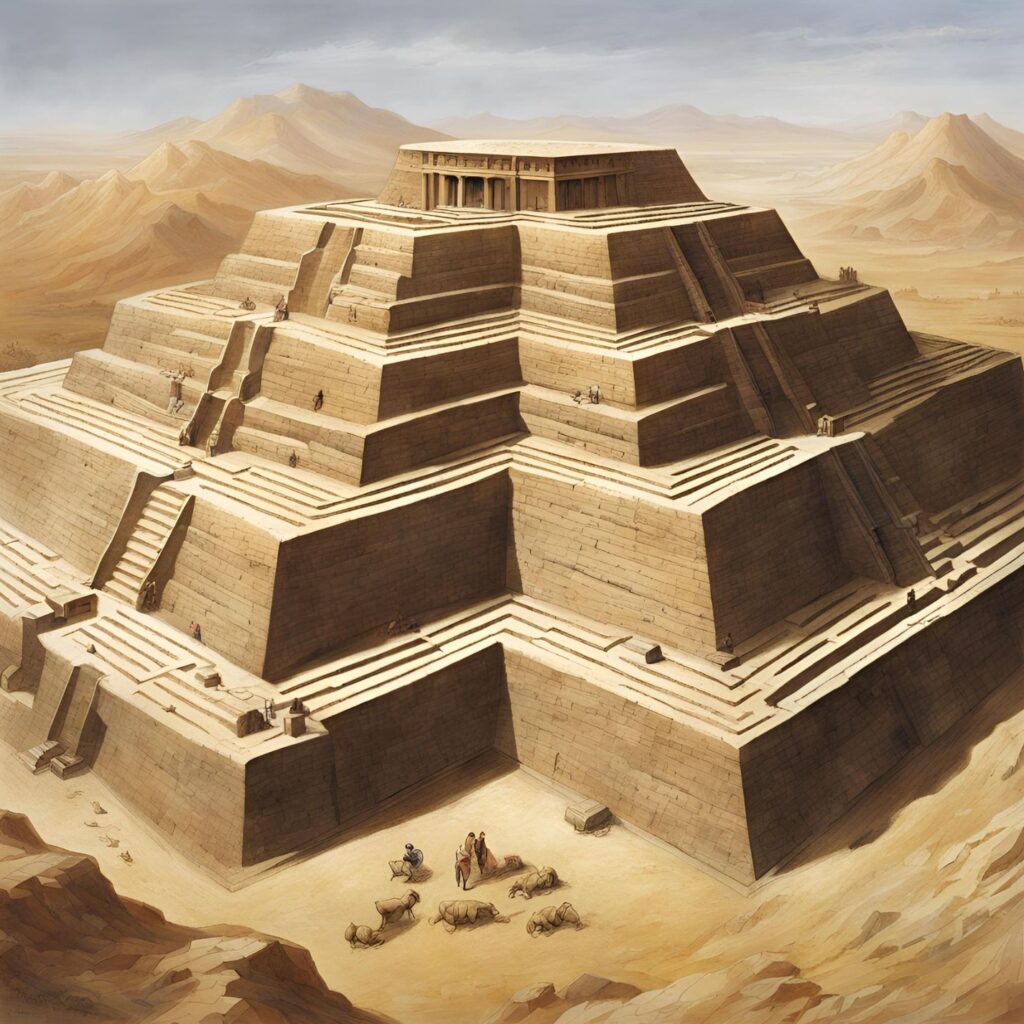
The passage describing the Tower of Babel falls between two chronologies. However, it is not clear where the event belongs within those chronologies. Both chronologies begin with Shem, so it is clear that the generations do not continue through both chronologies (Genesis 10:21–31, 11:10–32).
Bolls suggests that the Tower of Babel event occurred during the lifetime of Peleg since Genesis 10:25 notes that the earth was divided during his lifespan. He postulates this division refers to both the division of the people after God confused their languages as well as a physical dividing of the earth’s habitable space. The latter will be explained below.
Another factor to consider is the issue of textual variants. The Masoretic Text differs widely from the Septuagint. Both texts describe the lifespans of each generation. The Septuagint, however, tends to ascribe 100 more years to each patriarch than the Masoretic Text does. Bolls believes that the Septuagint preserves the original text in this passage. This results in a gap of approximately 700 years between the Tower of Babel and Abraham. It places the Tower of Babel in 2700 BC.
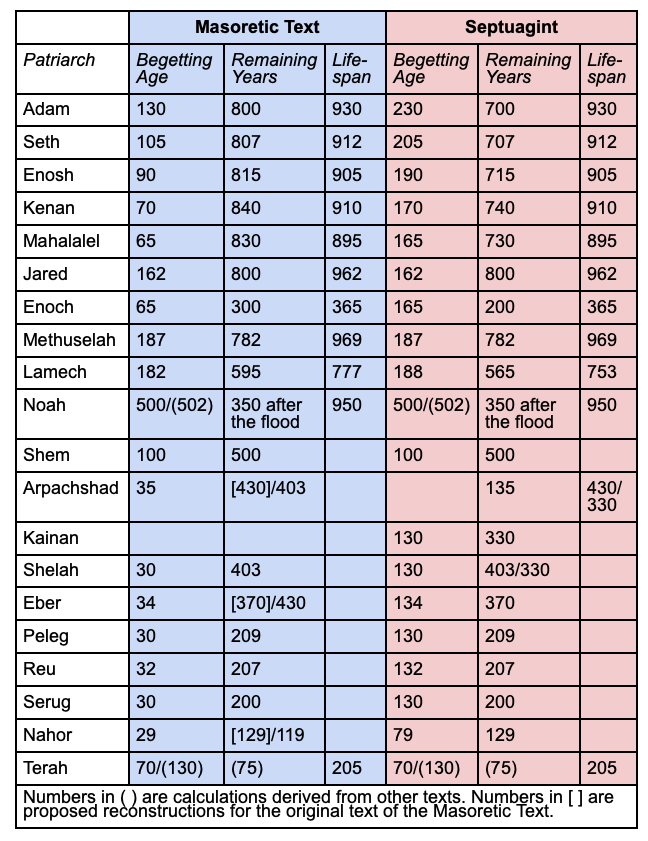
When Did Job Live?
Bolls places Job in the gap between Babel and Abraham and presents several reasons for doing so.
The first reason for placing Job within this period is that he mentions specific things that relate to this period. For example, Job mentions an animal, Behemoth, that does not appear in any other biblical book (Job 40:15–24). This may suggest Job lived in a time when certain large animals were about to go extinct. Another example is Job’s mention of men living in caves (Job 30:5–7). Bolls equates this with the period of cavemen. Bolls suggests that both references place Job in the period between Babel and Abraham.
Another reason that Bolls places Job in this period is his lifespan. The Masoretic text does not specify how long Job lived. However, he was already well-established in life when his troubles began, and he lived 140 additional years. Bolls suggests that Job lived somewhere between 240–250 years. He bases this on Septuagint variants that actually do specify Job’s age at death. The lifespans of the patriarchs shortened with successive generations. The lifespan that Bolls assigns to Job fits between those of Serug (330 years) and Nahor (209 years) in the Septuagint chronology. Nahor was Abraham’s grandfather, and Serug was Abraham’s great-grandfather.
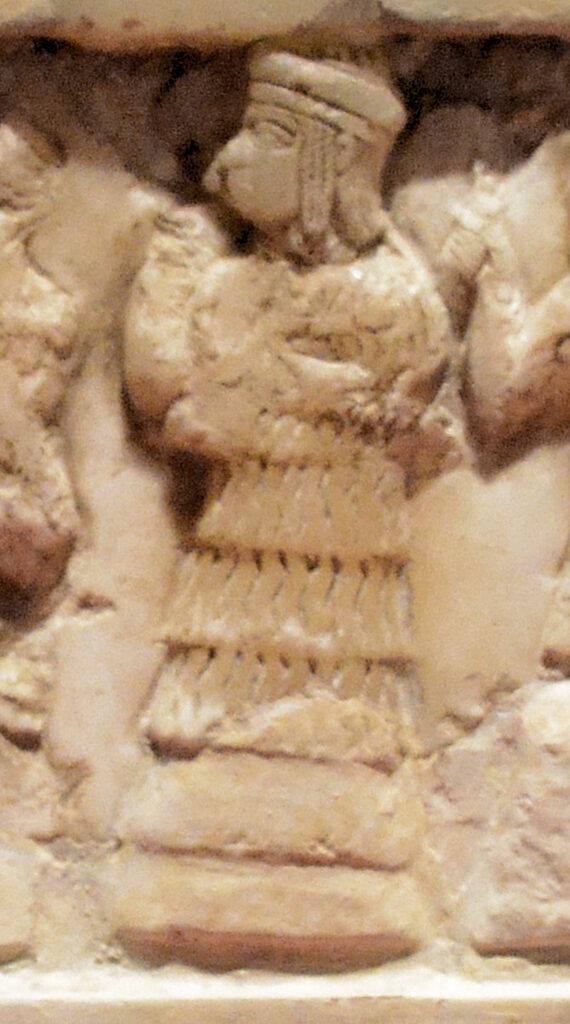
Bolls also considers the writing style of the Book of Job, comparing it to other writers from the pre-Abrahamic period. In particular, Enheduanna, the daughter of Sargon of Akkad. Enheduanna lived between 2285 and 2250 BC, and is the first known author according to conventional dating. Her writing style was well-developed and included both hymns and poems. Her flowery language is similar in style to that of Job.
One potential problem with placing Job this early in history is that he mentions iron (Job 19:24, 20:24, 28:2, 40:18, 41:27). The use of Iron did not become widespread until much later in history. However, Bolls points out that conventional scholarship recently discovered that people used meteoric iron during this period. Job could have therefore been acquainted with iron in the third millennium BC.
If Job did indeed live in the pre-Abrahamic period, is it possible that his name shows up in the biblical chronologies from that period? Bolls thinks that perhaps it does. He suggests that Job appears in Genesis 10:29, which mentions a son of Joktan named Jobab. Perhaps Jobab was in fact, Job.
Based on all these clues, Bolls concludes that Job likely lived around 2320 BC and therefore would claim the title as the world’s first recorded author.
How Does the Ice Age Fit In?
Bolls has determined when Job lived in relation to the biblical timeline and absolute dating. His next question is, when did Job live in relation to the Ice Age? Bolls leans on atmospheric scientist Michael Oard’s Ice Age timeline model. It proposes that the earth was at a glacial maximum at the time of the Tower of Babel. Thawing occurred over the next two centuries. As a result, sea levels throughout the world began to rise and land bridges disappeared. This completed the process of the dispersion of humans after the Tower of Babel event. By the time of Job, the Ice Age was nearing its end. Some of the larger animals that went extinct towards the end of the Ice Age may have still been alive, such as Behemoth.
How Did People Interact with God?
If Job did indeed live in the period between Babel and Abraham, then his story provides an important link in the story of God’s relationship with humans. It explains how people viewed God and interacted with Him during this transitional period.
Bolls believes that during this period, the knowledge of God was not lost. Job knew that he should make burnt offerings to God to atone for his children’s sins. He knew that God was just and that He had the right to do as He pleased. The book of Job portrays God as the Creator of the universe.
Melchizedek was another example of someone from the pre-Abrahamic period who worshiped God (Genesis 14:18–20). Although his lifespan overlapped Abraham’s, he was not of Abraham’s lineage. Like Job, he understood God outside of God’s communication with Abraham.
Thus, it seems that the knowledge of God was not lost at the Tower of Babel. Those who wished to serve God were able to do so. God called Abraham for a specific purpose, but he was not alone in interacting with God.
AI artwork created by Abigail Van Huss

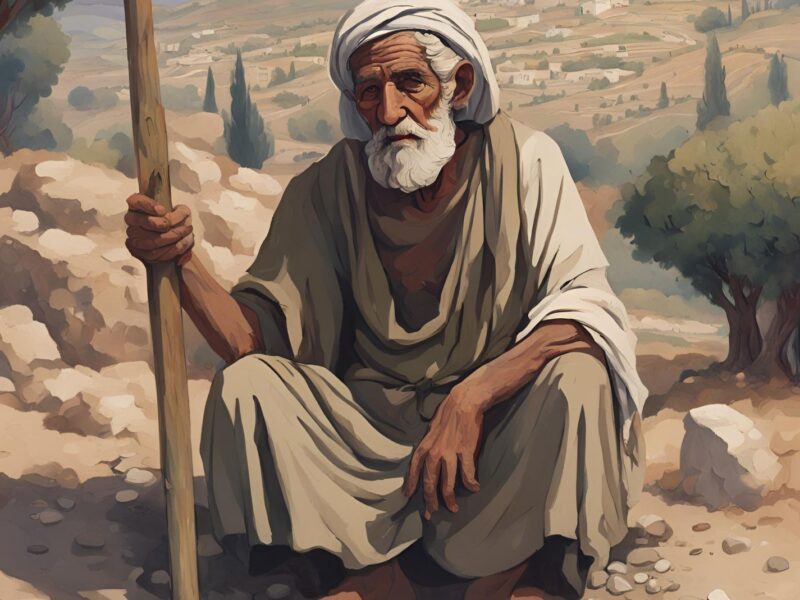
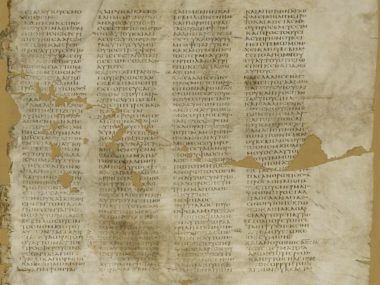
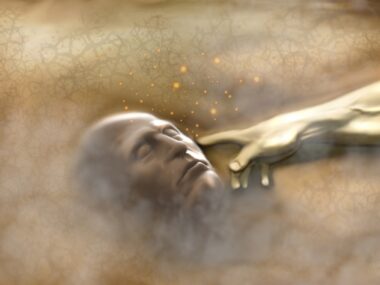

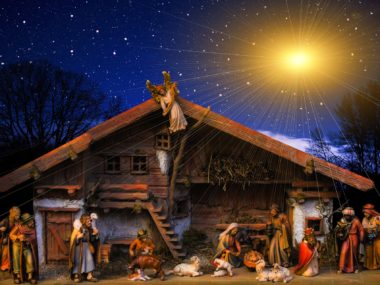

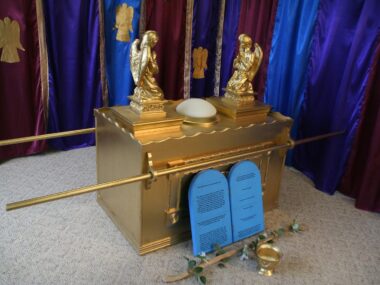




I don’t think this interpretation of Job agrees with other information we have in the Old Testament. Lamentations 4:21 equates the Land of Uz with Edom. And according to Genesis 36:10-11, Eliphaz was Esau’s son and Teman was Esau’s grandson. As for Bildad the Shuhite, he appears to descend from Shuah, the son of Abraham and Keturah who is mentioned in Genesis 25:2. It seems to me that the setting for the book of Job is early Edom and that Job was probably an early descendant of Esau.
Thank you for your comment. You’re correct Lamentations 4:21 equates Uz with Edom, however there’s more to the story. I actually addressed this objection in my presentation, and will do so in more detail in a forthcoming paper.
The clue is understanding the migration which occurred when Syrians (land of Aram & Uz of Gen 10) later moved to Edom as recorded in 2 Kings 16:6. Ancient sources (which had recourse to libraries and repositories with careful records we no longer possess) confirm this. I mentioned Ptolemy the Geographer, Josephus, LXX translators and others as examples.
As for the names, this too was addressed, and I admit at first blush seems a bit more difficult for my position, however I provided examples where names are inherited and frequently extend further back than later characters’ first appearance in Scripture. Also Eliphaz wouldn’t have been called a Temanite if the Gen 36 Teman was the first namesake (who was even younger than Eliphaz himself). There were earlier Temans and Eliphazes, just as Jobab in Gen 10 was earlier than Jobab in Gen 36.
It’s a fascinating topic and one very well and accurately laid out by Abigail here at New Creation. I believe when all the evidence is carefully assessed and weighed, the scales indeed tip in favor of the older Job timescale.
David, you may be correct, but I still find the evidence for an Edomite Job to be persuasive. I cannot prove that the name of Job’s friend Eliphaz the Temanite was a first namesake, but I think it is quite possible. If Eliphaz had a son named Teman who founded the Edomite settlement that bore his name, and dad lived in his son’s settlement, dad could very well have been known as Eliphaz the Temanite. And in that case, they could have been Esau’s son and grandson. There are a few other things I failed to mention in my previous post that should be considered. I note that the young man Elihu, who comes on the scene in Job 32, is identified as a Buzite (verse 2), which suggests that he descended from Nahor and Milkah’s son Buz (Gen 22:21). If this was the case, it also points to a post-Abrahamic setting for the book of Job. Furthermore, I doubt that Job lived to the age of 250. I say that because Job’s first children seem to have been young when they died; there is no mention of Job having grandchildren from his first family. But after the great disaster, Job and his wife had a second family – 10 more children who did provide Job and his wife with grandchildren and great grandchildren. Since Job lived for 140 years after his disaster (Job 42:16), if he lived to be 250, he would have been 110 years old at the time of the disaster. Now in a time when people lived longer lives, I suppose that would have been possible, but I think the weight of evidence I have mentioned suggests that Job was considerably younger than 110 at the time of his suffering and that he lived to be about Isaac’s age (180) or a little older. Lastly, I note that a Jobab appears in Gen 10:29, which could favor your early setting for Job. But another Jobab appears in Gen 36:33, who was the second king of Edom. Although the Hebrew spelling for Jobab is a bit different from the spelling for Job, this name could have been a variant of Job. But it is interesting that the early Edomite kings were not dynastic rulers, which suggests that they were chosen by the people. Did the early Edomites choose Job to be their ruler during the 140 years he lived after his disaster? Did they choose him at least partly because of the wisdom he gained from his disaster? Barring a major archaeological discovery, we probably won’t have the answers to these questions until we get to heaven. But I think they are possibilities. In conclusion, I think your early setting for Job is possible, but I think there is more evidence for the later Edomite setting. May God bless you!
Great article! Very informative.
I pushed 4 stars by mistake, I meant to pushed 5 instead. My recommendation would be to make it confirm the star selection you want before sending it away.
interesting and informative article. Good points but errors. Babel broke up probably because people could not get along with the new identities. not mere language problems. As today. I see no evidence at all that Peleg means the earth was divided. Any audience who read this would never conclude that. nOr is it relevant to god to explain minor things about the planet. it just means the people segregated after babel.
job time can be figured by his friends identity. they all lived in towns etc that only came into existencve much later. I understand Job is een as loving befoire moses but long after abraham. I deny there was a ice age. Instead there was a reaction to a great event including volcanic action about 2100-1900BC. tHe so called ice ge lasted a few centuries at most and notjhimng to do with ice. uts misinterpretation of remaining evidence for the ice age myth.i say. Job showed Men had awareness of hod before revelation by the books of the bible. nO excuses.
The evidence is from Genesis 10:25 which says that two sons were born to Eber; the name of the one was Peleg, for in his days the earth was divided; and his brother’s name was Joktan.
This is great information. Thank you for sharing.
Genesis 4:22 says that Tubalcain was “an instructor of every artificer of brass and iron.” This was well before Noah’s Flood and the Tower of Babel. Thus, it has no bearing on when Job might have lived.
Agreed. Iron seems to be particularly susceptible to deterioration in wet climates so if anything the “iron” age might be more of an indication when a region became arid instead of when they first learned to work with iron.
We need more articles Abigail, they’re so interesting 😭🙏
I just finished reading the Testament of Job, one of the books considered apocryphal not included in the canon. I must say that it is consistent with the biblical book of Job, although the dates of his lifespan are different, but it answers many of the questions presented here in the article and comments. He indeed identifies himself in the book as a son of Esau and brother to Nahor.
Nahor identifies himself as the one who wrote this book as narrated by Job and finished it for him (much like we believe Joshua completed Deuteronomy on behalf of Moses.) It’s amazing that in your research you included the work of an Akkadian poet Enheduanna for comparison but never thought to check the apocryphal Testament of Job for more clues. Judaism and Christianity have taught to ignore and disregard these books but there is truth in them consistent with the biblical accounts.
Thank you for your thoughts. The Testament of Job is certainly interesting. However, to the best of my understanding, it is a much later work than the book of Job, probably written around the first century BC, over a thousand years after the time of Job. So, while it may reflect some interesting historical memories of Job, it is not a comparable source.